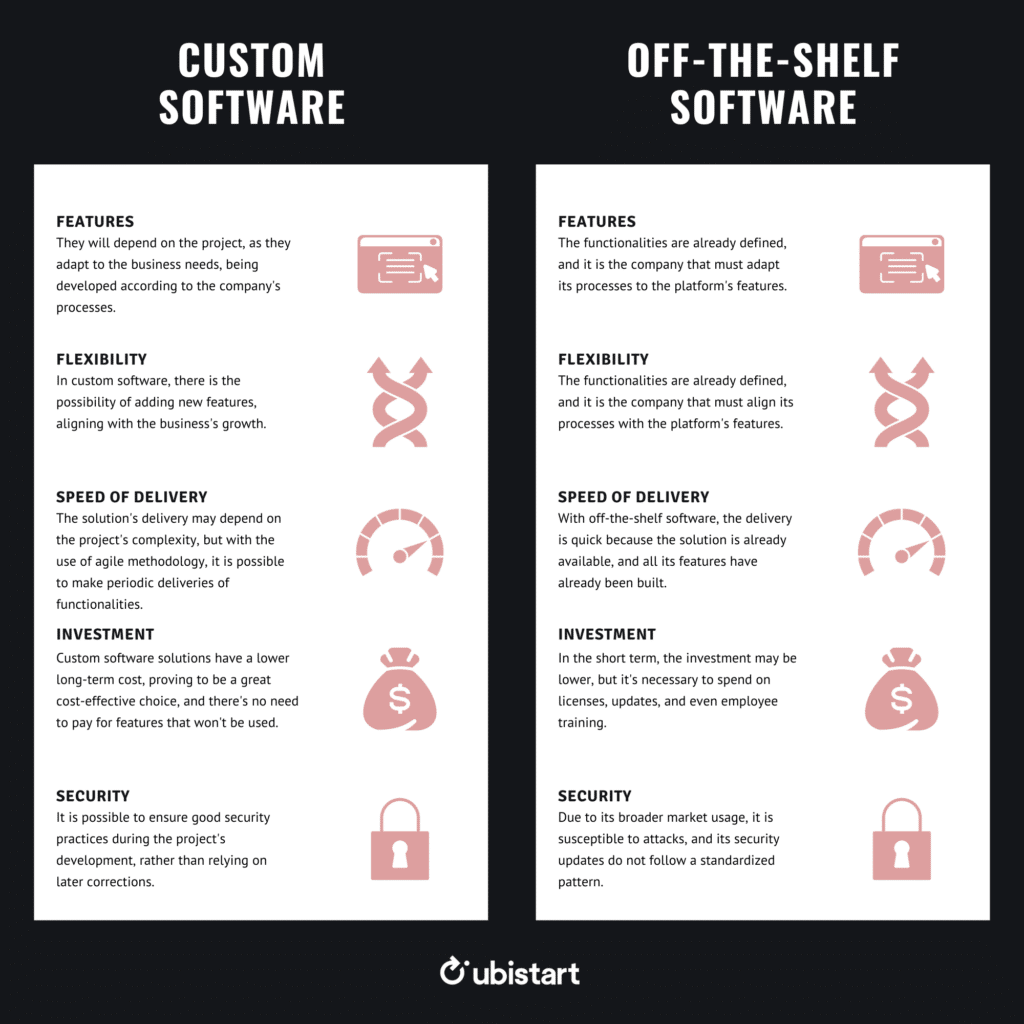For both employees’ daily routines and the company itself, it is undeniable that technological solutions significantly improve task performance.
In this context, the implementation of bespoke software can optimize and automate processes, resulting in benefits for productivity and company revenue.
To meet this expectation, the market today offers various types of software, including off-the-shelf solutions, customizable options, and tailor-made solutions.
But do you know what to consider before making this investment? Do you know what to analyze when hiring software for your company?
Continue reading to understand the points that should be addressed before choosing bespoke software, so that your decision brings real benefits to your business:
- Bespoke Software: What Is It
- Implementation Steps
- Advantages of Bespoke Software
- Understanding Your Company’s Needs
- Harnessing Software for Your Business
Bespoke Software: What Is It
Bespoke software refers to a solution tailored to the specific needs of the company that intends to implement it.
These solutions are relevant because, depending on the processes an organization needs to carry out, off-the-shelf software may not suffice. It is essential to be aware that the company must adapt to this type of solution.
This is because off-the-shelf software typically features generic tools to address more common problems. Nevertheless, they can still be effective for companies that are in the early stages of establishing their internal processes.
However, if your company has unique requirements that deviate from the standard, attempting to fit your needs into an off-the-shelf solution may lead to more challenges than effectiveness.
One of the significant advantages of bespoke software is its ability to be customized according to what your organization requires, aligning with the company’s strategic planning and business rules.
However, for custom software development to meet your company’s requirements, it must be structured through several stages. Learn more about these stages in the next section.

Implementation Stages
The development of bespoke software is based on the concept of agile methodology, a method that organizes the development process in a way that accelerates its completion.
Within this working dynamic, partial deliveries are made throughout the development process. This ensures that the software is molded to fit the company’s needs, allowing for ongoing monitoring of how the project is taking shape.
The implementation of bespoke software typically goes through several stages to ensure it adequately meets the company’s needs.
These stages may include identifying the company’s specific requirements, defining the software’s objectives and requirements, technical and financial feasibility analysis, among others.
In this context, the development process for bespoke software usually consists of at least 6 stages, assuming an open-scope project. The project is then executed following the phases below:
1. Definition of business rules
2. Planning and feasibility
3. Validation of the company’s needs with developers
4. Prototype assembly and testing phase
5. Validation and possible adjustments
6. Maintenance
It is important to remember that, at each of these stages, there should be clear and constant communication between the software development team and the company implementing it. This ensures that expectations are aligned and that the software is designed and developed according to the company’s needs and objectives.
Advantages of Bespoke Software
Initially, it’s essential to consider that you’ll have software that has been developed with a complete focus on your business’s needs, and you can monitor the entire process and adjustments to make the system as functional as possible.
The primary advantage of bespoke software is its ability to be customized. This means that the software can be designed to efficiently and effectively meet the company’s internal processes, workflows, and business requirements.
Furthermore, bespoke software can offer greater flexibility and scalability, allowing the company to make adjustments and improvements as objectives change over time.
This can be particularly useful for companies that are constantly evolving, seeking growth, or have complex and unique business dynamics and requirements.
Another advantage is the possibility of integration with other systems and existing software within the company, which can enhance internal process efficiency and productivity, avoiding task duplication and the need for rework.
Understand Your Company’s Needs
However, before reaping these benefits, it is essential to analyze the company’s situation, implementation costs, and the integration of this tool with the team.
It is important to involve stakeholders within the company, such as managers, employees, and others involved in processes that will be impacted by the bespoke software.
Ensuring that everyone’s needs are taken into account during the implementation of bespoke software is crucial, especially those working in the operational areas.
Nevertheless, in some cases, off-the-shelf software may suffice for what your company is seeking, depending on the maturity of your business. Therefore, carefully evaluate the stage at which your company is situated.
Harness Software to Benefit Your Business
In summary, the implementation of bespoke software can bring numerous advantages to a company when carefully planned and executed.
Understanding the company’s specific needs, following the appropriate implementation stages, and considering the expected return on investment are crucial.
With a well-designed and developed bespoke software, a company can significantly enhance its efficiency, productivity, and revenue, making it more competitive in the market.
Need assistance? Rely on a software factory with a skilled team. At Ubistart, we specialize in custom digital solutions, prioritizing software quality and functionality within the organization.
Leave a message, and we will assess your needs to develop the best solution.




